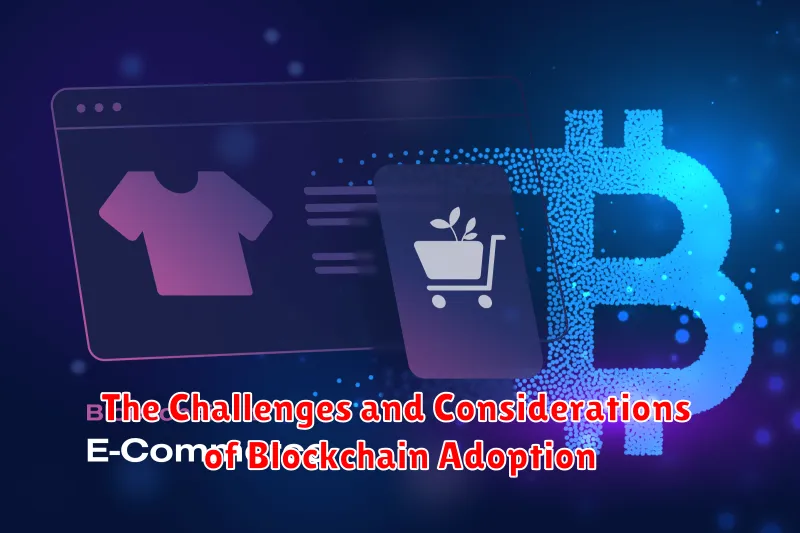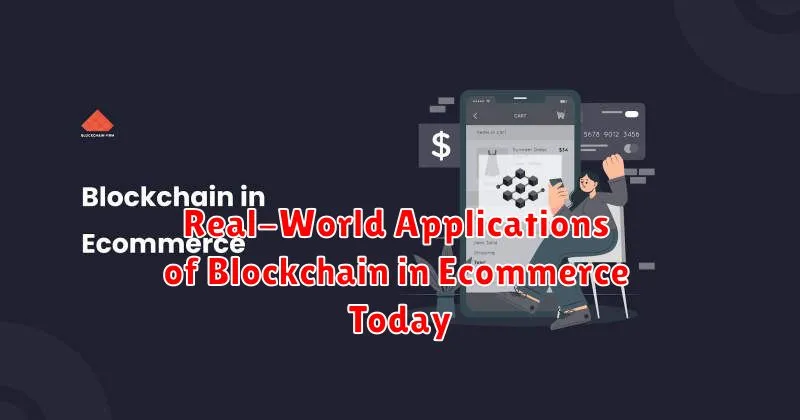The world of online retail is undergoing a radical transformation, and at the heart of this revolution lies blockchain technology. Once considered a niche concept, blockchain has emerged as a powerful force with the potential to reshape the very fabric of e-commerce. This groundbreaking technology, best known for its role in cryptocurrencies like Bitcoin, offers a decentralized and secure platform for transactions, paving the way for a more transparent, efficient, and consumer-centric digital marketplace.
From streamlining supply chains to enhancing customer trust and security, blockchain‘s impact on e-commerce is multifaceted and far-reaching. This article delves into the transformative potential of this technology, exploring its key benefits and exploring how it is set to revolutionize the online retail landscape. Prepare to uncover how blockchain is poised to redefine the future of shopping, empowering both businesses and consumers alike.
Understanding the Basics of Blockchain Technology
Blockchain technology is a revolutionary distributed ledger that has the potential to transform various industries, including online retail. At its core, a blockchain is a secure and transparent system that records transactions across a network of computers. This decentralized approach eliminates the need for a central authority, making it highly resistant to tampering and fraud.
One of the key features of blockchain is its decentralization. Instead of relying on a single entity, transactions are recorded on multiple computers within the network. This decentralized nature makes it incredibly difficult for anyone to alter or manipulate the data.
Another fundamental concept is cryptography. Blockchain uses complex mathematical algorithms to secure transactions and protect the integrity of the data. Each block in the chain is cryptographically linked to the previous one, creating an unbreakable chain of records.
Immutability is another defining characteristic of blockchain. Once a transaction is recorded on the blockchain, it cannot be altered or deleted. This ensures the authenticity and immutability of data, building trust and transparency into the system.
The blockchain’s unique features have far-reaching implications for online retail, promising to revolutionize everything from supply chain management to customer loyalty programs.
Enhanced Security and Transparency in Transactions
One of the most compelling benefits of blockchain technology in e-commerce is its ability to enhance security and transparency in transactions. Traditional online transactions rely on centralized intermediaries like banks and payment gateways, which can be vulnerable to fraud and data breaches. Blockchain, on the other hand, offers a decentralized and immutable ledger, eliminating the need for third-party intermediaries and minimizing the risk of fraud.
Every transaction on the blockchain is recorded and encrypted, creating a transparent and auditable trail. This ensures that all parties involved have access to a verifiable record of the transaction, reducing the possibility of disputes and increasing trust between buyers and sellers.
Furthermore, blockchain’s inherent security features, such as cryptography and consensus mechanisms, make it extremely difficult for malicious actors to tamper with or alter transaction data. This significantly reduces the risk of unauthorized access and data breaches, providing a secure and reliable platform for online transactions.
Streamlining Supply Chain Management
Blockchain technology is set to transform the online retail industry by revolutionizing supply chain management. The decentralized nature of blockchain creates a transparent and immutable record of every transaction and movement of goods, eliminating the need for intermediaries and reducing the risk of fraud and counterfeiting.
Through blockchain, retailers can track products from origin to delivery with real-time visibility, enhancing transparency and accountability. This eliminates the need for manual data entry and reconciliation, streamlining processes and reducing errors. Moreover, the shared ledger system eliminates the need for multiple copies of data, fostering collaboration and trust among all stakeholders in the supply chain.
Smart contracts, another key feature of blockchain, automate critical supply chain processes, such as payment and delivery confirmation. This reduces the need for manual intervention and ensures timely execution of agreements. By leveraging blockchain, online retailers can significantly improve supply chain efficiency, reducing costs, minimizing delays, and enhancing customer satisfaction.
Building Trust and Authenticity with Blockchain
One of the key challenges facing online retail is the lack of trust between buyers and sellers. This is particularly true when it comes to the authenticity of products. Counterfeit goods are a major problem, costing businesses billions of dollars every year. Blockchain technology can help to address this issue by providing a secure and transparent way to track the provenance of goods.
Each transaction on a blockchain is recorded in a permanent and immutable ledger. This means that every step in the supply chain, from the manufacturer to the retailer, can be tracked and verified. This transparency helps to build trust between buyers and sellers, as it makes it much harder for counterfeit goods to enter the market.
For example, a luxury watch manufacturer could use blockchain to track the origin of its watches and ensure that they are genuine. Each watch could be assigned a unique identifier that is stored on the blockchain. This identifier would be updated with every transaction, from the factory to the retailer and finally to the customer. This would allow consumers to verify the authenticity of their watches and ensure that they are not buying counterfeit goods.
In addition to tracking the provenance of goods, blockchain can also be used to improve the authenticity of products. For example, a company could use blockchain to create a digital certificate of authenticity that is linked to a product. This certificate could include information about the product’s materials, manufacturing process, and origin. This would allow consumers to verify the authenticity of the product and be confident that they are buying a genuine item.
By building trust and authenticity, blockchain has the potential to revolutionize online retail. It can help to create a more level playing field for businesses, protect consumers from fraud, and increase confidence in online transactions.
Empowering Customers with Decentralization
One of the most compelling aspects of blockchain technology in e-commerce is its ability to empower customers by fostering decentralization. This means shifting power away from centralized intermediaries and giving it back to individuals. This has significant implications for customer experience, data ownership, and trust in online transactions.
Increased Transparency and Traceability: Blockchain’s immutable ledger provides a transparent and auditable record of transactions, allowing customers to track the origin and journey of products. This enhanced transparency can lead to greater trust in brands and products, as customers can be assured of their authenticity and quality.
Enhanced Data Control: In a decentralized ecosystem, customers have greater control over their personal data. Blockchain can facilitate data ownership and management through decentralized identity solutions, allowing users to decide who can access their information and how it is used.
Reduced Reliance on Intermediaries: Blockchain can streamline online transactions by eliminating the need for third-party intermediaries like payment processors and escrow services. This can result in faster, more efficient, and potentially lower-cost transactions.
Empowered Communities: Decentralized marketplaces and platforms powered by blockchain can foster closer relationships between businesses and customers. These platforms allow for direct interaction, feedback, and even co-creation, empowering communities to influence product development and service offerings.
The empowering effects of decentralization through blockchain technology can significantly enhance the customer experience in e-commerce. It promotes transparency, trust, and control, ultimately leading to more secure, efficient, and personalized online shopping journeys.
Reducing Fraud and Counterfeiting
One of the most significant impacts of blockchain technology on e-commerce is its ability to reduce fraud and counterfeiting. Blockchain’s inherent transparency and immutability make it incredibly difficult for fraudulent activities to take place. Every transaction is recorded on the blockchain, creating an indelible and publicly verifiable trail. This makes it impossible for individuals to alter or delete records, significantly reducing the risk of fraudulent transactions.
Furthermore, blockchain can be used to verify the authenticity of products. By incorporating product information directly onto the blockchain, retailers and consumers can be assured that they are dealing with genuine products. This is particularly beneficial for combating counterfeiting, a pervasive problem in the online retail sector. By using blockchain, businesses can track the entire supply chain, from raw materials to final delivery, ensuring product authenticity and preventing the sale of counterfeit goods.
In addition to reducing fraud and counterfeiting, blockchain technology also empowers businesses with a secure and transparent system for managing and tracking inventory. This enhances trust between retailers and consumers, building confidence and encouraging repeat purchases. The immutability of the blockchain ensures that data about inventory levels, product origins, and supply chain movements is readily available and tamper-proof, providing an unassailable record of all transactions.
Improving Payment Processing and Efficiency
Blockchain technology is poised to revolutionize online retail by significantly improving payment processing and efficiency. One of the most prominent ways it achieves this is through the elimination of intermediaries, such as banks, in financial transactions. This direct transfer of value between parties dramatically reduces transaction fees, ultimately benefitting both businesses and consumers. Furthermore, blockchain facilitates faster and more secure payment processing, minimizing processing times and risks associated with traditional methods.
The decentralized and transparent nature of blockchain creates a robust system for managing payments. Transactions are recorded on a shared ledger, making them immutable and auditable, eliminating the possibility of fraud or double-spending. This enhanced security and transparency build trust between buyers and sellers, fostering a more reliable and secure online shopping experience. With these advantages, blockchain technology is paving the way for a future where online payments are faster, cheaper, and more secure, ultimately driving the growth and efficiency of e-commerce.
Creating New Opportunities for Loyalty Programs
Blockchain technology has the potential to revolutionize loyalty programs, creating new opportunities for businesses to engage with customers and build stronger relationships. Traditionally, loyalty programs have been centralized, making them susceptible to fraud, data breaches, and lack of transparency. Blockchain’s decentralized nature addresses these concerns, enabling secure and transparent loyalty programs that benefit both businesses and customers.
With blockchain, customer data is stored securely and immutably on a distributed ledger, making it virtually impossible for unauthorized access or manipulation. This enhances trust and transparency, encouraging more customers to participate in loyalty programs. Moreover, blockchain allows for the creation of crypto-based loyalty points, offering greater flexibility and value to customers. These points can be easily traded, redeemed, and even exchanged for other cryptocurrencies or goods and services, creating a more dynamic and rewarding loyalty program.
Blockchain also enables the creation of interoperable loyalty programs, where customers can seamlessly connect their loyalty points across different businesses. This creates a more unified and rewarding experience for customers, allowing them to accumulate points faster and access a wider range of benefits. Additionally, blockchain can empower customers with greater control over their data, allowing them to choose how their data is used and shared.
In conclusion, blockchain technology provides a robust and innovative solution for enhancing loyalty programs, creating new opportunities for businesses to engage with customers and build stronger relationships. By leveraging the transparency, security, and interoperability of blockchain, businesses can create more rewarding and engaging loyalty programs that cater to the evolving needs of the modern consumer.
The Challenges and Considerations of Blockchain Adoption

While the potential benefits of blockchain technology in e-commerce are vast, its adoption faces significant challenges and considerations. One key obstacle is the scalability of blockchain networks. Current blockchains struggle to handle high transaction volumes, leading to delays and increased costs. This is particularly problematic for e-commerce platforms that require fast and efficient transactions.
Another challenge is regulatory uncertainty. The legal framework surrounding blockchain technology is still developing, with varying interpretations and regulations across different jurisdictions. This lack of clarity can deter businesses from implementing blockchain solutions due to concerns about compliance and legal repercussions.
Furthermore, interoperability between different blockchain platforms is a major hurdle. The lack of standardized protocols and data exchange mechanisms hinders seamless integration and data sharing across different systems. This fragmentation hinders the development of a truly interconnected e-commerce ecosystem.
Finally, security concerns remain a major obstacle. While blockchain technology is inherently secure, vulnerabilities can still exist within its implementation. Moreover, the decentralized nature of blockchain can make it challenging to address security breaches effectively. Businesses must invest in robust security measures and adopt best practices to mitigate these risks.
Despite these challenges, the benefits of blockchain technology in e-commerce are undeniable. Addressing these concerns through ongoing research, development, and collaboration is crucial for unlocking the full potential of this transformative technology.
Case Studies: Ecommerce Businesses Leveraging Blockchain

The potential of blockchain technology in revolutionizing ecommerce is undeniable. From enhancing security to streamlining supply chains, blockchain is transforming the way businesses operate. Here are some prominent case studies of ecommerce companies leveraging blockchain to their advantage:
1. Walmart: Walmart, a retail giant, has been exploring the potential of blockchain in its supply chain. They use blockchain to track food products, ensuring their origin and quality, which helps in maintaining transparency and efficiency in their operations.
2. JD.com: JD.com, a leading Chinese e-commerce platform, utilizes blockchain technology to streamline its cross-border logistics. This allows for faster and more efficient international shipments, improving customer satisfaction.
3. OpenBazaar: OpenBazaar is a decentralized marketplace where buyers and sellers can interact directly without a central authority. It operates on the blockchain, enabling secure and transparent transactions while eliminating the need for intermediaries.
4. Everledger: Everledger utilizes blockchain technology to track diamonds and other valuable items, creating a secure and transparent record of ownership, authenticity, and provenance. This helps in preventing fraud and enhancing trust within the luxury goods industry.
These are just a few examples of how blockchain is transforming the e-commerce landscape. As blockchain technology continues to evolve, we can expect to see even more innovative applications emerge, further disrupting the traditional e-commerce model and creating a more secure, transparent, and efficient online retail experience.
The Future Landscape: Blockchain’s Potential in Shaping Ecommerce

The integration of blockchain technology is poised to dramatically reshape the landscape of ecommerce. Blockchain offers a decentralized, secure, and transparent platform that can revolutionize various aspects of online retail, from supply chain management to payment processing.
One of the most significant impacts of blockchain is its potential to streamline and enhance supply chain transparency. By creating an immutable record of goods’ origin, movement, and condition, blockchain enables real-time tracking and verification. This increased visibility benefits both consumers and businesses, as it allows for the authentication of products, reduction of fraud, and improved quality control.
Furthermore, blockchain can revolutionize payment systems within ecommerce. Decentralized payment networks built on blockchain technology offer faster, more secure, and cost-effective transactions. Eliminating the need for intermediaries, such as banks, reduces transaction fees and processing times, making cross-border transactions more efficient. Moreover, blockchain’s inherent security features enhance fraud prevention and protect sensitive financial data.
In addition to enhancing transparency and payment systems, blockchain empowers new business models and customer experiences. Smart contracts, self-executing agreements stored on the blockchain, automate processes such as order fulfillment and returns, reducing manual effort and potential errors. Blockchain also facilitates loyalty programs and rewards systems, offering personalized experiences and building stronger customer relationships.
However, the full adoption of blockchain in ecommerce requires addressing challenges such as scalability, regulatory clarity, and consumer education. As the technology matures and infrastructure develops, its impact on online retail will become increasingly significant. By embracing blockchain’s potential, ecommerce businesses can unlock a future of greater efficiency, trust, and customer satisfaction.
Real-World Applications of Blockchain in Ecommerce Today

While the buzz around blockchain in ecommerce has been growing, it’s important to understand its tangible applications in the real world. Beyond just buzzwords, blockchain brings real benefits and efficiency to the e-commerce landscape.
One of the most prominent applications is in supply chain transparency. Blockchain creates an immutable record of a product’s journey from origin to consumer, allowing businesses to track goods in real-time and ensure their authenticity. This is particularly beneficial for industries like luxury goods and pharmaceuticals, where counterfeiting is a significant concern.
Another significant impact of blockchain is on payment processing. By streamlining transactions and eliminating intermediaries, blockchain allows for faster, cheaper, and more secure payments. Cryptocurrencies, powered by blockchain, offer alternative payment methods that can be particularly attractive to international shoppers.
Loyalty programs are also being revolutionized by blockchain. By creating a secure and transparent system for tracking customer loyalty points, blockchain can enhance customer engagement and build stronger brand loyalty.
Moreover, blockchain enables decentralized marketplaces, fostering a more equitable and transparent environment for buyers and sellers. This empowers independent businesses and creators to operate more freely, reducing reliance on traditional platforms.
The impact of blockchain in ecommerce is just beginning to unfold. As technology evolves and adoption grows, we can expect even more innovative applications to emerge, shaping the future of online retail.

